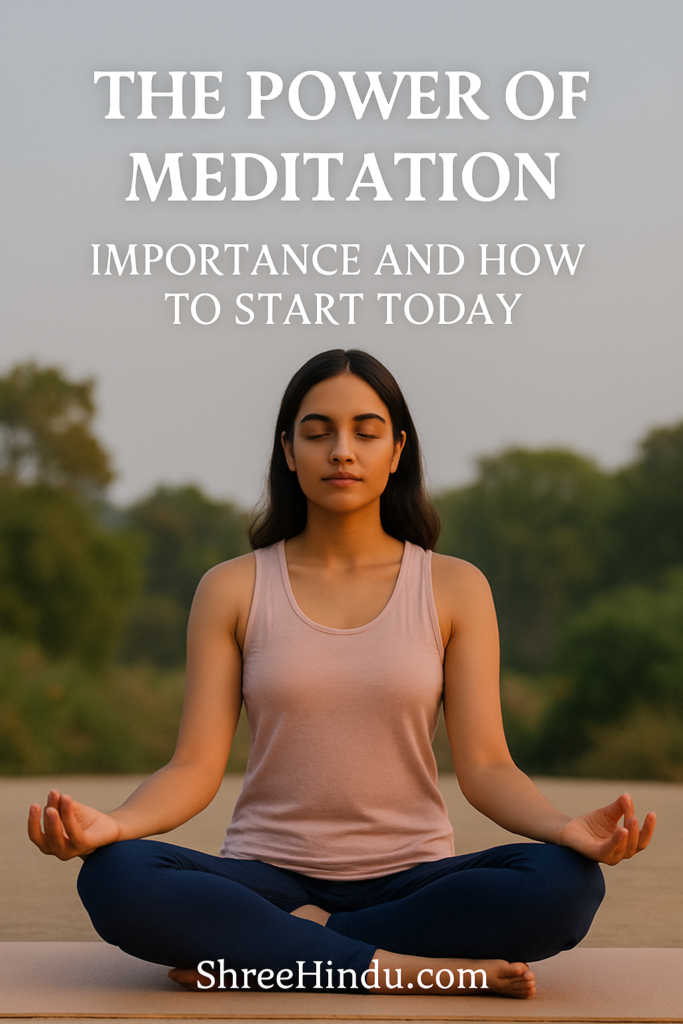The Power of Meditation: Why It Matters and How to Do It
What is Meditation?
Meditation is a simple yet powerful practice that trains your mind to focus and redirect thoughts. It has been practiced for thousands of years in many cultures, particularly in India, as a way to connect with inner peace and higher consciousness.
At its core, meditation helps you observe your thoughts and feelings without judgment. It’s like taking a break from the noise of life and reconnecting with yourself.
Why is Meditation Important?
Whether you’re a student, a working professional, or a homemaker, meditation can bring powerful benefits to your daily life:
1. Reduces Stress and Anxiety
Meditation lowers the stress hormone cortisol, calming your body and reducing anxiety. Just 10 minutes a day can bring noticeable changes in how you feel.
2. Improves Concentration
By practicing mindfulness, you train your brain to focus better and stay present. This improves your productivity, memory, and mental clarity.
3. Enhances Emotional Health
Meditation promotes self-awareness and helps you develop a more positive outlook. Many people report feeling happier and less reactive after meditating regularly.
4. Improves Sleep
Struggling with sleep? Meditation helps calm your nervous system, making it easier to fall asleep and get deep rest.
5. Boosts Physical Health
Regular meditation has been linked with lower blood pressure, better heart health, and a stronger immune system.
How to Do Meditation (Step-by-Step Guide)
Starting meditation doesn’t require any special equipment. Here’s a simple way to begin:
Step 1: Find a Quiet Place
Sit in a quiet and comfortable place where you won’t be disturbed for 5–10 minutes.
Step 2: Sit Comfortably
You can sit on a chair, cushion, or floor. Keep your back straight and relax your shoulders.
Step 3: Close Your Eyes and Breathe
Close your eyes gently. Take deep breaths—in through your nose, out through your mouth. Focus on the sensation of your breath.
Step 4: Focus Your Attention
Concentrate on your breath, a word (like “Om” or “Peace”), or even your heartbeat. Your mind will wander—that’s normal. Gently bring it back.
Step 5: Start Small
Start with 5 minutes a day and gradually increase to 15–20 minutes. Consistency is more important than time.
Types of Meditation
- Mindfulness Meditation: Focus on the present moment.
- Guided Meditation: A teacher or recording guides you.
- Transcendental Meditation: Repeating a mantra silently.
- Loving-kindness Meditation: Focus on love and compassion.
- Breathing Meditation: Observe your breath rhythm.
Tips for Beginners
- Don’t judge your thoughts.
- Be patient—it’s normal for your mind to wander.
- Try guided meditation apps like Headspace, Calm, or YouTube.
- Best time to meditate is early morning or before bed.
Final Thoughts: Start Your Journey Within
Meditation is not about becoming a different person or having no thoughts. It’s about becoming aware and being present. Even a few minutes daily can bring long-term benefits for your mind, body, and soul.
Start small, stay consistent, and watch your life transform—one breath at a time.
Frequently Asked Questions (FAQs)
Q1. How many minutes should I meditate daily?
Start with 5–10 minutes and increase as you get comfortable.
Q2. Is meditation religious?
While rooted in spiritual traditions, meditation is now widely practiced as a secular wellness tool.
Q3. Can I meditate lying down?
Yes, but you may fall asleep. Sitting helps you stay alert.
Q4. When is the best time to meditate?
Morning or before bed, but anytime is fine as long as you’re consistent.





